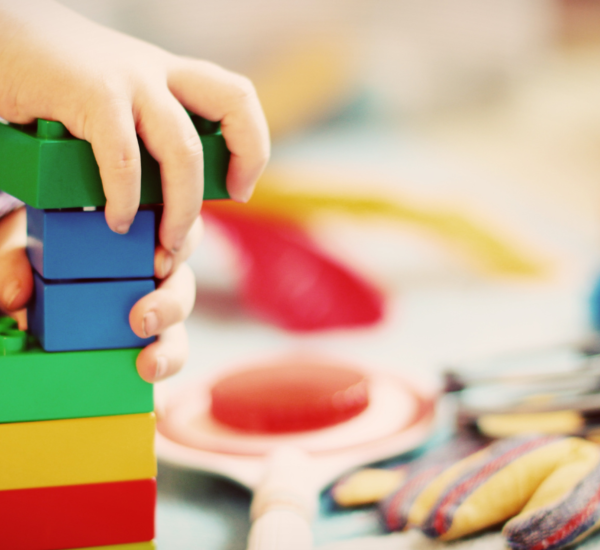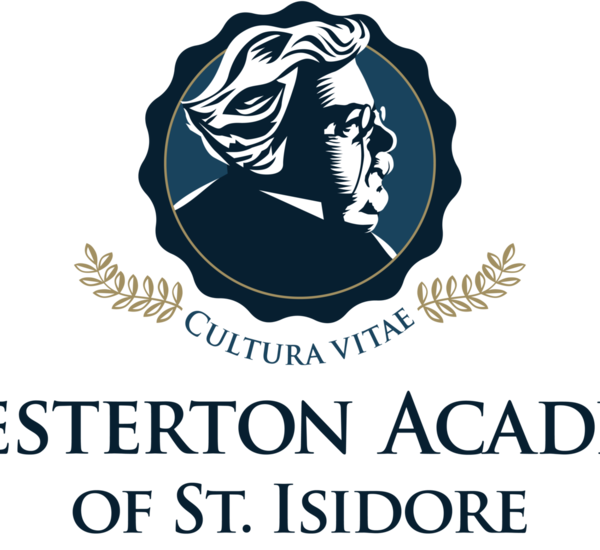High School
Why Chose St. Isidore As Your Online School
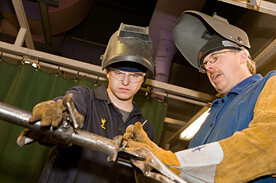
We offer a full range of programs, from vocational Registered Apprenticeship Program (RAP) to preparation for trade and technical schools to academic courses including our classical Chesterton Academy.
Are you uncertain of your future career path? A well-rounded education, with a general approach, is a great way to find out what you love.
Flexibility – Students can work at their own pace while still enjoying live-time support, completing courses in a way to work around their lives.
Human Touch – Our web platform and philosophy are built around communication and connection, and our school believes that contact between teachers and students encourages success. We offer live teacher communication, and online students are able to drop in to visit or seek assistance at our Outreach facility (by appointment)
Cutting Edge Platform – Canvas is user-friendly and provides interactive and engaging features as well as a parent platform to support student learners.
Outstanding Teachers – Our teachers are committed to the success of their students! They are knowledgeable in their fields and are a friendly, engaging bunch, happy to sit down and make you feel welcome.
Semester Schedule
High School Completion Requirements
✝️ Religion Requirement Statement
Religion is at the heart of all that we do.
As a faith-based learning community, we are committed to nurturing the spiritual growth of every student. All students are required to complete a religion course as part of their academic journey. These courses are not only essential for fulfilling graduation requirements but also central to understanding our mission, values, and identity.
Through the study of scripture, tradition, moral decision-making, and service, students are encouraged to develop a deeper relationship with God, build a strong foundation in Catholic teachings, and live out their faith in meaningful ways.
English Language Arts
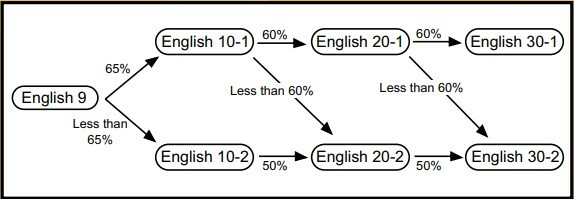
English 10-1/20-1/30-1
(5 Credits)
In the academic stream of English Language Arts students will study, in depth, the literary genres of modern drama, short story, novel, Shakespearean drama, film, essay, and poetry. Along with these in-depth literary studies, student expectation to respond critically and personally to these texts becomes progressively more advanced in preparation for university. A variety of writing, reading, and project based assignments are designed to strengthen comprehension and communication skills. The academic stream is a rigorous course designed for students who want to gain university entrance. Students who wish to register in this stream should achieve a 65% or higher in English 9 and a 60% or higher in their high school prerequisite courses (see chart below). At the 30-1 level, students will be required to write a two-part Provincial Diploma worth 30% of their final mark.
English 10-2/20-2/30-2
(5 Credits)
This functional stream of English Language Arts is designed for students who do not plan on attending university or for students who struggle with the course content of English Language Arts. A variety of literature, print, and visual texts will be studied in order to further develop students’ reading and writing skills. Students may be able to use this course for SPECIFIC post-secondary entrance. At the 30-2 level, students will be required to write a two-part Provincial Diploma worth 30% of their final mark.
Mathematics

Mathematics -1 (10C, 20-1, 30-1)
(5 Credits)
Do you want to study mathematics or sciences at a university, college, or technical institute and go on to a related career? This route is for students who plan on entering post-secondary programs such as engineering, mathematics, sciences, some business studies, or other programs that require advanced math skills. This sequence is a co-requisite for Mathematics 31 and may be required for post-secondary calculus courses.
Mathematics 31 (Calculus)
(5 credits)
Mathematics 31 emphasizes the theoretical and practical development of topics in the algebra of functions, trigonometry, differential calculus and integral calculus up to a standard acceptable for entry into all first-year programs in mathematics, science, engineering and business. The course is designed to bridge the gap between the Mathematics 10-20-30 course sequence and the calculus course sequences offered by post-secondary institutions.
Mathematics -2 (10C, 20-2, 30-2)
(5 Credits)
Do you want to attend a university, college, or technical institute after high school, but do not need calculus skills? This route is for students who plan on studying at the post-secondary level in diverse fields, including arts programs, some engineering technologies, medical technologies, and some apprenticeship programs. This path will fulfill most students’ needs. Mathematics -2 is designed with a great deal of flexibility, so that the student may switch sequences in Grade 11 or 12 if his or her interests change.
Mathematics -3 (10-3, 20-3, 30-3)
(5 Credits)
Are you interested in learning the mathematics needed to enter most trades or will you be entering the work force after high school? This route is for students who plan to apprentice in a trade or enter the work force directly after high school. It is designed to meet the entrance requirements for apprentices in most trades programs.
Sciences
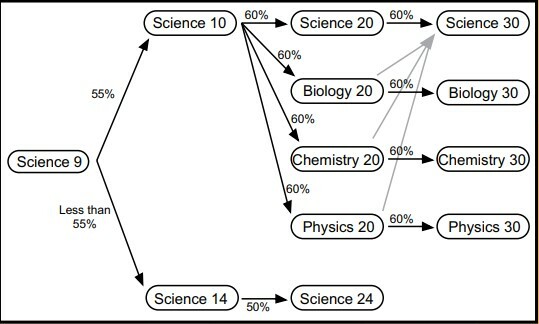
Science 10/20/30
(5 Credits)
Science 10, 20, and 30 are general science courses intended for students who want to study science without specialization. They combine the study of Biology, Chemistry, and Physics into one course. All students must take Science 10; from here they can continue on in Science 20 and 30, or specialize into Biology, Chemistry, and/or Physics. These courses are recommended for students who plan on attending university, college, and select technical school programs. Students should earn a 55% in Science 9 and a 60% in high school prerequisite courses to continue in this course sequence (see chart below). All 30-level courses in this academic course stream have a Provincial Diploma worth 30% of the final grade.
Science 14/24
(5 Credits)
Science 14 and 24 concentrate on hands-on and practical science concepts. These courses are geared for students who do not plan on attending university, but will be entering trade schools and select college programs, and for students entering the work force directly from high school. This route satisfies the requirements for a high school diploma but does not have a Provincial Diploma Exam at the conclusion of the program.
Biology 20/30
(5 Credits)
Biology is a natural science concerned with the study of life and living organisms, including their structure, function, growth, evolution, distribution, and taxonomy. Some topics covered in Biology 20 and 30 include ecosystems and populations, human systems, cells, reproduction and development, genetics, and the nervous and endocrine systems. Biology 20 and 30 are requirements for pursuing further study at post- secondary institutions in areas such as general sciences, dental assistant, kinesiology, nursing, physiotherapy, medicine, and radiation technology.
Physics 20/30
(5 Credits)
Physics is the study of matter, energy, and the interactions between them. Students may wish to take Physics 20 and 30 if they have a desire to investigate and understand how things work, and have a strong mathematical background. Physics 20 and 30 is recommended for students who plan on entering post- secondary fields such as power-engineering, ultrasound and x-ray technician, engineering, and medicine.
Chemistry 20/30
(5 Credits)
Chemistry provides an ordered way of learning about the nature of matter, based on observation and evidence, through laboratory discovery and course work. Chemistry 20 and 30 courses explore the science of fizz, pop, flame, and BOOM! through the study of bonding, gases, solutions, acids and bases, titration, thermodynamics, electrochemistry, equilibrium, and organic chemistry. Chemistry 20 and 30 are recommended for students who plan on entering a science-based post-secondary field such as animal studies, IT and electronics, engineering, nursing, sciences, and trades.
Science Electives
Forensic Science 25
(3 Credits)
Pre-requisite: Science 10, 14, or 24
This course explores topics such as: Types of crime scene evidence, fingerprint, trace evidence, and bodily fluid analysis, DNA evidence in investigating and prosecuting crimes, document analysis in investigating and prosecuting crimes, polygraph testing, impaired driving and blood alcohol testing.
Forensic Science 35
(3 or 5 Credits)
Prerequisite: Forensic Science 25
Forensic Science 35 explores topics such as: The investigative process, law enforcement equipment and police canines, criminal profiling, forensic anthropology, and forensic entomology, forensic toxicology, arson, explosives, and ballistics, footwear, tire, and tool mark impressions.
Social Studies
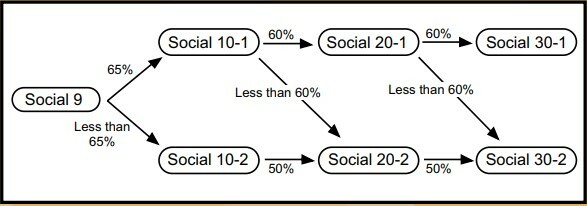
Social Studies 10-1/20-1/30-1
(5 Credits)
In the academic stream of Social Studies students will acquire, analyze, and evaluate information about the history of the world beginning with the Age of Discovery to the Modern day through the lens of globalization, nationalism, and ideologies. Students will be trained to apply this material to many different examinations in preparation for post-secondary programs. Students will gain an appreciation for the greater world issues and gain an in-depth knowledge of how these issues affect their lives and society. Students are expected to work through the content at a higher standard, and emphasis will be placed on the ability to create and defend a position with evidence and understanding of the course content. There will be an emphasis on formal humanities-style writing. Students should earn a 65% in Social 9 and a 60% in high school prerequisite courses in order to continue in this course stream (see chart below). Social Studies 30-1 includes a Diploma Exam worth 30% of the final mark.
Social Studies 10-2/20-2/30-2
(5 Credits)
This functional stream of Social Studies is taught in a manner that is more accessible for students that are less interested in Social Studies or do not plan on attending university or select college programs. This stream is geared mainly for students attending select college programs or technical school programs, and for students entering the work force directly after high school. The information and class content is very similar to that of the Social Studies -1 stream, however the evaluation of the curriculum is different and the study of material is less intense. This stream offers students a diploma route that emphasizes hands-on learning, more oral discussion, and a de-emphasis on rigorous exams and formal writing. Social Studies 30-2 includes a Diploma Exam worth 30% of the final mark.
Religious Studies

Religious Education 15
(3 Credits)
The aim of this course is to assist students, with the help of the Gospel, to participate as Christians in the shaping of our culture. The program explores major cultural issues from a Christological perspective. Beginning with their own life experiences, students acquire a deeper and more systematic knowledge of themselves, Christ’s message, and the Church. Connections between the Church and contemporary culture are explored in terms of what it means to be a responsible adolescent disciple developing as a member of a Catholic Christian community while living within the context of a broader culture
Religious Education 25
(3 or 5 Credits)
This course invites students to deepen their relationship with Jesus through a prayerful study of Scripture. Students will explore the Jewish historical, religious, and cultural world into which the Messiah was born and the Old Testament covenants fulfilled. Using the Gospels as primary sources, the course explores Jesus’ birth, early life, and ministry; his preaching of the Kingdom of God; his teachings and miracles. It focuses on the events of Jesus’ death, resurrection, and ascension – looking to their central significance in the Church’s understanding of Jesus as the Christ, the Son of God.
Religious Education 35
(5 Credits)
This course challenges students to understand themselves as moral persons called to discipleship by living the way of Christ. Through an examination of ethical theories, the revelation of sacred Scripture, and the lived experience and teaching of the Catholic Church, the course invites students to mature as active participants in their faith. At the heart of catechesis is the human search for happiness as the completion of the superabundant love of God. This course encounters the tension between the revelation of God’s love to humankind and explores our response through human reason - particularly in the areas of freedom, justice, human relations, ecology, reconciliation, community and political life.
Health and Wellness

Career & Life Management (CALM 20)
(3 Credits)
All high school students in Alberta are required to complete CALM 20 to earn a High School Diploma. The primary objectives of the course are to help the student to develop a positive self-concept and an understanding of personal interests, values, aptitudes, and abilities; to promote independent personal management by developing the ability to make choices and accept challenges; to develop an understanding of health as a resource for everyday living; to develop knowledge about career options; to develop the ability to deal with feelings; and to develop an awareness of sexuality, its implications and the choices related to it.
Physical Education 10
(3 or 5 Credits)
This course places an emphasis on developing and refining skills of familiar sports as well as an introduction to unique recreational games. Attention is given to the basis of skill development and understanding strategies common to many different sports, and an examination of physical fitness practices and the theory behind them. Sportsmanship and respectful interaction between students, wellness, and active lifestyle concepts will also be covered.
Physical Education 20
(5 Credits)
The goal of the Physical Education 20 course is to enable students to further develop and master the knowledge, skills, and attitudes necessary to lead an active, healthy lifestyle through a variety of activities in games, individual activities and alternative environments.
Physical Education 30
(5 Credits)
Successful completion of this course will prepare students for a life-long commitment to physical fitness and well-being. Completion will also prepare students for the challenges of post-secondary education in this field.
General Psychology 20
(3 Credits)
This course is designed to develop the understanding and skills that make it possible for more effective living in our complex environment. Attention will be focused on the social approaches to understanding human behaviour so that students may appreciate more fully the reasons that underlie their own actions and the actions of others. Topics of study include personality, behaviour, intelligence, influences on behaviour, and understanding and perception. This course is designed as a basic introduction to the field of psychology.
Personal Psychology 20
(3 Credits)
This course is designed to develop the understanding and skills that make it possible for more effective living in our complex environment. Attention will be focused on the social approaches to understanding human behaviour so that students may appreciate more fully the reasons that underlie their own actions and the actions of others. Topics of study include the history of psychological schools of thought, principles of learning, process of thinking, facing frustration and conflict, emotional problems, behaviour disorders, and career opportunities in psychology. This course is designed as a basic introduction to the field of psychology.
Abnormal Psychology 35
(3 Credits)
Prerequisite: General Psychology 20 OR Personal Psychology 20
This course is designed to provide an overview of abnormal behaviours and the conditions that affect individuals in our society. Topics of study include views of abnormality, casual factors, types of disorders, as well as assessment, prevention, and treatment.
Fine Arts and Humanities Options
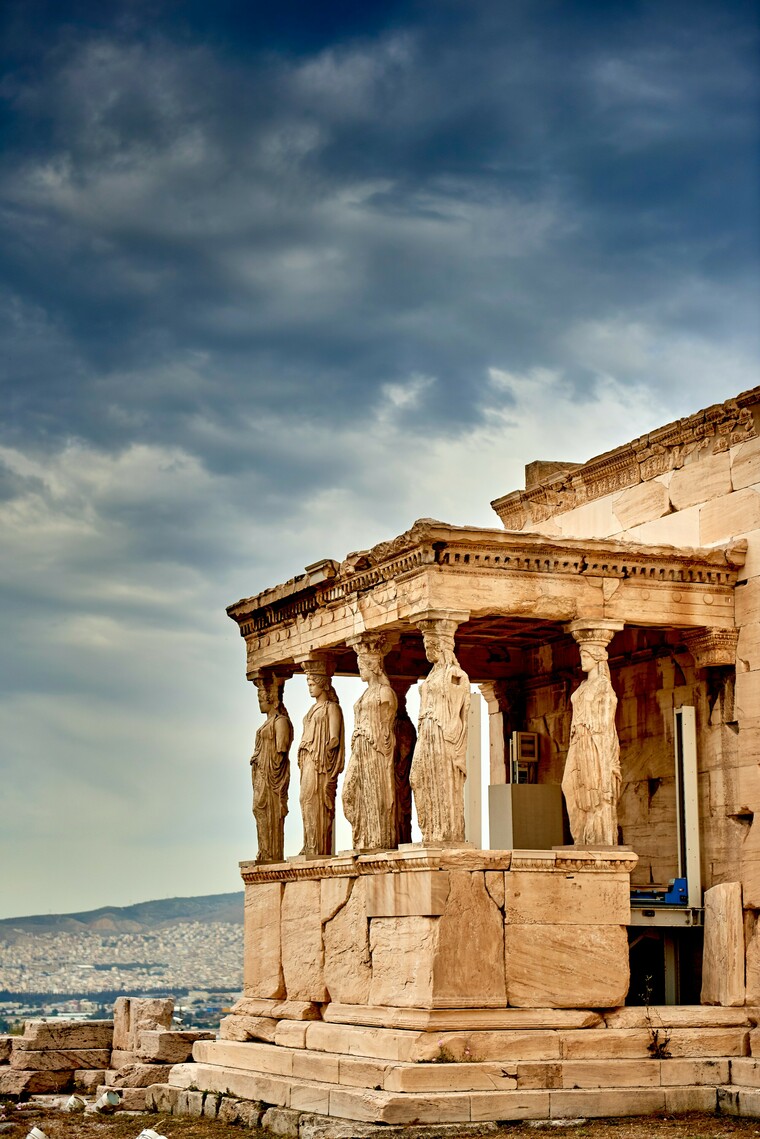
Art 10/20/30
(3 or 5 Credits)
In Art, students will develop an appreciation and understanding of design, drawing, painting, printmaking, sculpture, stained glass, and art history. Students will learn the fundamentals of art and will have the opportunity to explore a variety of art making mediums, techniques, and styles. Art 20 and 30 encourages students towards greater proficiency and self-expression through visual media. Budding artists are encouraged to develop their own personal style through research and practical studio work. Originality of design and idea are emphasized with a personal portfolio of work which serves as the final product for the course.
Creative Writing 15/25/35
(3 or 5 Credits)
Creative writing is designed to immerse students in writing, focusing first on the characteristics that make up various genres through reading and writing in those genres. Students will engage in a workshop format, exploring a process which is both creative and collaborative. Throughout the course, students will keep reflective journals that document their awareness of the process of writing, revising, and editing. By the end of the course, they will produce “final drafts”, samples from their working portfolio, and one showcase piece. At higher levels, students will work on longer forms of fiction and/or compilations of shorter forms, with some exploration of publication markets and processes. This should be a blast. That is all. Students who enjoy creativity and language should sign up and try it out!
Classical Mythology 15
(3 Credits)
Mythology, particularly Greek mythology, stands as one of the cornerstones of Western art, whether it be poetry, sculpture, or drama. Students will study a survey of Greek myth: the Titans, the Wars of the Gods and Titans, Zeus and the Olympians, and the heroic tales (Hercules and Perseus). Throughout the course students will work through case studies of how classical mythology is incorporated into our culture, in language, or literary and artistic references. The study of Greek mythology is a valuable precursor to any serious study of the Humanities as well as being an interesting area of study for its own sake.
Western Philosophy 20/30
(6 Credits)
The Western mind is shaped by philosophy, yet we all too rarely consider the roots of how we envision the world and ourselves. Western Philosophy will teach the students logic and the formulation of argument, as well as consider the big questions of existence and knowledge. A fascinating study in its own right, Philosophy is designed to enhance the Humanities cores of St. Isidore Learning. Students should enroll whose futures include studies in the Humanities, as well as those students who are simply fascinated by discussion of big ideas.
Languages

French 10
Prerequisite: French 9
(5 Credits)
This course is designed for students who have elementary and junior high background in French. Students will engage in various language activities in structured contexts to develop fundamental written and oral skills. The focus is on comprehensible and accurate usage of verb tenses and vocabulary building.
French 20
Pre-requisite: French 10
(5 Credits)
Students will continue to use a multidimensional approach to develop knowledge of French vocabulary, grammar, and culture. Engaging in grade level specific language activities in structured contexts will enable all students to develop advanced written and oral skills. Themes include the senses and feelings, fads and fashions, close friends, and consumerism.
French 30
Pre-requisite: French 20
(5 Credits)
After having studied French through elementary, junior high, and high school, students will have the opportunity to put all of their knowledge into practice. Topics covered will include the world of work, travel and tourism, the role of the media, and conservation and the environment. Students will have many opportunities to practice communicating with one another through various forms of technology. Focus will be given to coherence in written and spoken forms as well as the conditional tense.
Latin 10/20/30
(5 Credits)
The Latin language program has been designed to develop reading proficiency in the language of the ancient Romans, as well as introducing the student to the history of that civilization. The program assumes no prior second-language experience and gradually introduces the student to Latin grammatical features. Traditionally held as good preparation for the studies of Law and Medicine, Latin also provides a sound basis for any of the biological sciences, the humanities, linguistics, and logic. Research also suggests that Latin study can increase performance in English reading and writing. A historical/cultural component further introduces the student to one of the key sources of Western society. Note: each of Latin 10, 20, and 30 is offered as a language course for 5 credits.
CTS and Off Campus
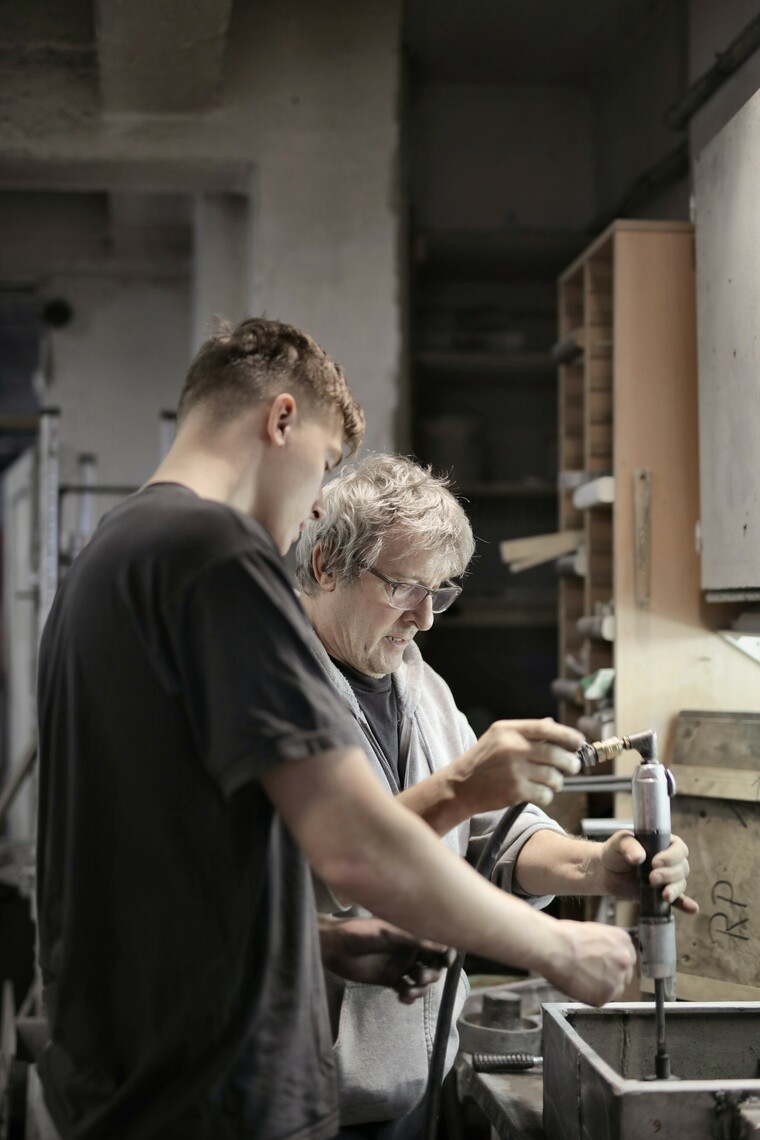
Road Trip 101
(1 Credits)
We believe that those students who have a strong understanding of online tools available to them, and who understand how to navigate their online learning platform to do better. To that end, we’ve designed an online course which takes students on a guided tour of the various sites, tools, and techniques, etc. to help them succeed. Learn how to communicate online, how to use our LMS (Learning Management System), and how to make the most of the Google suite of apps available to you.
*All full-time St. Isidore Online Learning students will take the Road Trip course.
Foods 10/20/30
(3 or 5 Credits)
Each Foods class consists of 3 or 5 courses taken at the introductory, intermediate, or advanced level. As the students progress through the courses they become less dependent on the teacher for direction and actively manage their own learning. By developing basic, integrated, and career specific knowledge, skills and attitudes in the context of foods, students will have the ability to adapt to the challenges of change with increased flexibility and confidence.
Workplace Safety Systems (HCS 3000)
(1 Credit)
Students gain the attitudes, knowledge, and skills related to workplace health and safety and examine relevant legislation required in the workplace. This course is the pre-requisite for participating in Work Experience 10/20/30 and the Registered Apprenticeship Program (RAP) and is offered in CALM 20.
Workplace Safety Practices (HCS 3010)
(1 Credit)
Prerequisite: HCS 3000
Students explore workplace safety principles and practices, and apply these principles and practices to a variety of contexts. This course is recommended for students entering the Registered Apprenticeship Program (RAP) and is offered in CALM 20.
Green Certificate
(5-16 Credits)
Prerequisites: HCS 3000 and AGR 3000
The Green Certificate Program is an industry driven agricultural training program. Its apprenticeship style of delivery ensures that participants learn through actively performing the skills required. This means learning, hands-on, out in the barn, field or corral and getting dirty. It also means having a trainer who is knowledgeable and interested in the trainee’s success. There are several areas of study: Beekeeping, Cow/Calf, Dairy, Equine, Feedlot, Field Crop, Green House Technician, Irrigated Field Crop, Sheep and Swine. Alberta Agriculture, Food & Rural Development (AAFRD) works in partnership with the agriculture industry and Alberta Education to offer Green Certificate to all Albertans.
Work Experience 15/25/35
(3-30 Credits)
Pre-requisites: HCS 3000 and HCS 3010
SILC offers a Work Experience program that enables students 15 years or older to become involved in a new learning experience. After completing the pre-requisite safety and workplace training (HCS 3000 & HCS 3010), students are able to use a paid or volunteer position to explore a future career and receive practical on-the-job training, all while earning high school credits. Students develop work search strategies and tools to access a registry of employers partnered with SILC, or use local, provincial and national job banks to seek employment. Students who are employed by an approved worksite may earn between 3 and 30 credits, 15 of which may be used towards their high school diploma.
Registered Apprenticeship Program (RAP)
(5-45 Credits)
Pre-requisite: HCS 3000
The RAP program provides students with the opportunity to spend part of their school year completing high school diploma requirements and part of their year working as a registered apprentice in one of Alberta’s 52 registered trades. After successfully completing related safety training and course work, students begin employment at an approved worksite, learning on the job and acquiring hours toward their journeyman’s status. Students will also receive a wage from their employer. Students must complete grade 10 before starting a RAP placement, but they can begin to apply for RAP in the second semester of grade 10. Students should have an interest in working with their hands and a willingness to learn new skills. Our employers want students who will show up on time and work hard. You can better your chances of getting a RAP placement by attending and passing all of your courses. Make sure you research some trades so you can make an informed decision. It is possible to earn up to 45 credits with 25 credits going towards your high school diploma. Students can register in up to eight RAP courses in a trade, with each RAP course involving 125 hours of on-the-job learning and worth 5 credits. Once completed you may qualify for a government RAP scholarship.

